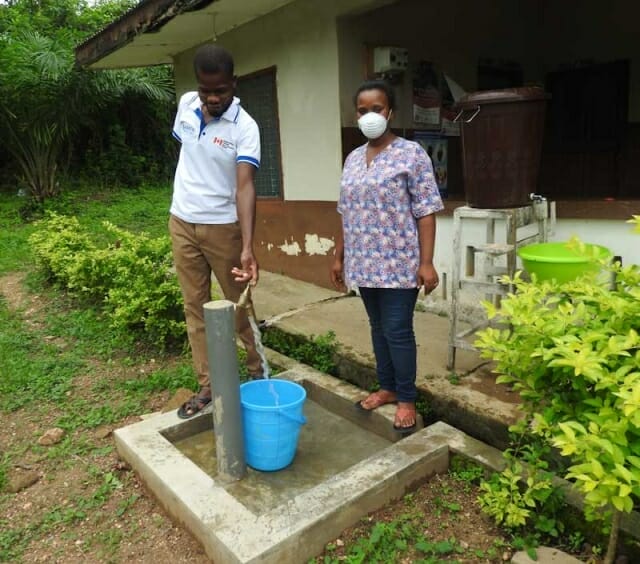News > Blog
Effective Health Care Delivery Made Easier for Nine Health Care Facilities with Provision of Water
Published 07/23/2020 by Global Communities

“At about 12 midnight in June 2019, a baby boy was born to a young couple at the Tutukpene Health Center in the Oti Region. Unfortunately, there was no water to wash the mixture of blood and amniotic fluid off the baby and the equipment used for the delivery. Relatives of the newborn’s mother had to save their congratulatory wishes until after they fetched water from the nearby community, about 15 minutes away, on foot. Thankfully the baby survived,” recounted Monica Hwanompe, the Senior Community Health nurse, who doubles as a midwife at the Health Center.
Provision of Water Supply
This scenario was a common trend in some Health Centers and Community-based Health Planning Services (CHPS), community-based health care facilities in the Savannah and Oti Regions until recently. In June 2020, nine facilities benefitted from mechanized boreholes under the USAID funded-WASH for Health Project, implemented by Global Communities. A mechanized borehole uses electric submersible pump to pump water into an elevated tank connected to stand pipes and/or taps. The nine health care facilities that were earmarked for water supply are Soma, Kulmasa, Nahari, Saru, Gbeniyiri – in the Savannah Region; Nabu, Lakpor, Pusupu CHPS compounds and Tutukpene Health Center – in the Oti Region. These water facilities will serve the entire community in which they exist. Global Communities’ WASH for Health team, during the COVID-19 pandemic, were motivated by the plights of the health care facilities and others like it, to provide mechanized boreholes, hence working tirelessly whiles observing COVID-19 safety protocols.
Handwashing Facility
Each facility has been provided with a sink in the delivery rooms for handwashing and washing equipment. Previously, according to Abigail Appiah, the midwife- in-charge of the Kulmasa CHPS compound, “Only one Veronica bucket served the delivery room which sometimes accommodates two to three deliveries at a time, but with the provision of the sink with constant water flow, they are relieved of the undue pressure.” Doreen Smith, the nurse-in-charge at Soma CHPS, added: “With this water facility readily available, convulsion and high temperature cases can be better managed.”
Provision of Solar Power
Four out of the nine health care facilities which were not connected to the national grid (Soma, Saru, Gbeniyiri and Nabu CHPS compounds) currently have functional solar power installed as part of the project. The solar power source will power the submersible pump and illuminate the entire CHPS compound including the delivery rooms. Until the intervention, some of these health care facilities were using torchlights and candles to provide services during the night.
Maintenance of Facilities
The midwives and staff pledged to keep the water facility clean, use the water judiciously and report anomalies immediately to the Water Sanitation Management Teams (WSMTs) that will seek professional assistance. “We will ensure the facilities are well maintained and cleaned because we know how it felt to be deprived of these facilities,” Juliet said.
Other Water Interventions
Aside from these mechanized boreholes for the CHPS, there are other water facilities under construction for communities in these two regions. Currently 22 boreholes have been drilled and are at various levels of completion. Two small town water supplies systems are also under construction at Kalba and Tinjase in the Savanah and Oti regions, respectively. Upon completion, each facility, which is made up of a pump house, (WSMT) office, an elevated tank and standpipes will serve about 16,000 residents altogether.





